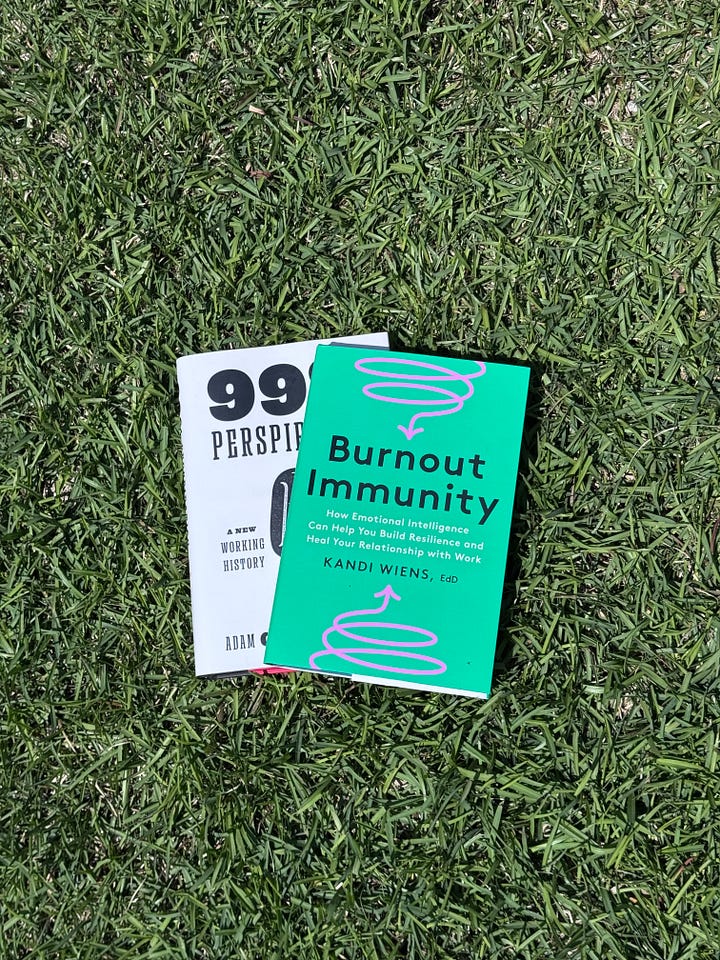Hello and I hope you are feeling good this week. It’s my birthday week and Easter is on Sunday, so I’m feeling pretty joyful. I’ve always loved Easter. It feels like spring really sets in upon it’s arrival, and it reminds me of childhood memories of my mom’s garden starting to take off. My mom is a prolific flower gardener and the flowerbeds at the home I grew up in were always awash with color and life.
Gardening has a reputation as an older person’s hobby. You don’t see too many teenagers out there planting and pruning. I thought about this when I came across an article in Good Housekeeping the other day about the growing popularity of “grandma hobbies”. Younger people are picking up activities that your grandma likely engages in, like knitting, gardening, baking, puzzling, crochet, and birding.
I’ve seen this trend gain steam among myself and my friends. I’ve always loved to bake, but I have leaned into that more often over the last decade of my life. I am also trying to grow flowers, although I have a long way to go and a lot to learn. A friend has created a flourishing vegetable garden over the last few years. I don't know if I'm noticing these hobbies becoming more prevalent because they are indeed getting more popular, or because we are getting older. Maybe people also picked up a grandma hobby during the pandemic because these activities can be done solo, and stuck with it.
I had a vague sense that these kinds of hobbies can be good for you, but I didn’t fully appreciate just how good until I read this article. In the Good Housekeeping piece, author Marisa Lascala introduces five mental health benefits gained from grandma hobbies:
Improved cognition - learning a new skill promotes neuroplasticity, which is your brain’s ability to change over time by developing new neural pathways. This improves brain functions like memory and problem solving. These hobbies can help keep you mentally sharp. Learning a new skill, especially one involving hand and eye coordination, keeps our brain healthy, especially as we age.
Trauma processing - Lascala explains that “bilateral movements” from some of these activities can function like Eye Movement Desenitization and Reprocessing (EMDR), a psychotherapy method used to process trauma that often involves tapping or holding buzzers in each hand. These hobbies can help you work through traumatic experiences so that their negative effects on your mental health decrease over time.
Sense of accomplishment - you can receive a happiness boost from setting a goal related to your hobby and working towards it. This benefit relates to the theme of my last post about success. Working toward an intrinsic goal (one that is important and meaningful to you and not motivated by external factors) of, say knitting that sweater, can make you happier, more creative, and more resilient.
Mindfulness - these hobbies help you focus on the present moment, similarly to mindfulness meditation, which produces mental health benefits. Lascala points out that these activities can help you enter a “flow state” - recognized as a state of dialed-in productivity that involves being completely absorbed in the present moment. I found an adult coloring book while out in Montana last month, and I noticed how focused and yet relaxed it felt to work on a picture. Time passed without my noticing.
Connection - if you engage in the hobby with a friend or group, this adds in a final benefit of providing opportunity for community. This can help fight the negative effects that result from loneliness, which is significant problem in our society right now. Groups dedicated to these hobbies are taking off. A local bookstore in my city has a monthly event called “Stitch and Bitch” with the direction to bring a needle-craft project to work on in a group setting.
All those benefits from crocheting a hat or making that sourdough loaf? Incredible!
I think these hobbies are particularly great for moms because they provide a relatively easy way to carve out space and time for something that is just for us. These hobbies are fairly inexpensive, can be done at home, and can be done whenever you may have a free hour of time. I hear from so many working mothers that their weeks race by in a blur with all time spent on their two jobs: their paid work and caregiving. It’s important to have something just for you, and I encourage you to be selfish about it. Take an hour or two each weekend, or a certain night during the workweek that everyone knows is yours, to engage in your hobby. Use those boundaries, ditch the guilt, and create.
I’ve had a starter embroidery kit sitting in my drawer since Christmas (by the way, here is a nice explanation of embroidery vs. cross stitch vs. needlepoint in case you, like me, have heard those terms but don’t really know the difference). I’ve never done it and I admit that I’m a little intimidated to try. This seems like a sign for me to get that kit out and take that first step. Let's do this together.
Thank you SO much for reading. Please feel free to share this or any of my posts if they speak to you. I am truly grateful for your support.


And some other thoughts on…
Chappell Roan isn't sure she wants kids because all of her mom friends are miserable. If I was going to write about her comments, this piece is pretty much what I would write.
Scientists agree that stress makes cancer worse...yet another reason to fight burnout culture.
Everyone is sick of the high cost of concert tickets (and Ticketmaster).
Tracy Chapman, who doesn't give interviews, gives an interview.
A provocative and thought-provoking call to eliminate all nation borders.


